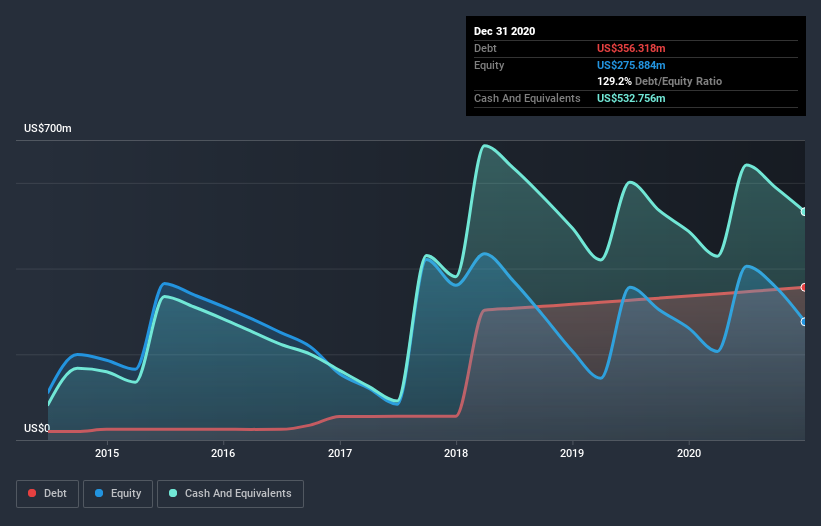Legendary fund manager Li Lu (who Charlie Munger backed) once said, 'The biggest investment risk is not the volatility of prices, but whether you will suffer a permanent loss of capital.' So it seems the smart money knows that debt - which is usually involved in bankruptcies - is a very important factor, when you assess how risky a company is. We note that Insmed Incorporated (NASDAQ:INSM) does have debt on its balance sheet. But should shareholders be worried about its use of debt?
When Is Debt Dangerous?
Debt assists a business until the business has trouble paying it off, either with new capital or with free cash flow. Part and parcel of capitalism is the process of 'creative destruction' where failed businesses are mercilessly liquidated by their bankers. However, a more common (but still painful) scenario is that it has to raise new equity capital at a low price, thus permanently diluting shareholders. By replacing dilution, though, debt can be an extremely good tool for businesses that need capital to invest in growth at high rates of return. The first thing to do when considering how much debt a business uses is to look at its cash and debt together.
View our latest analysis for Insmed
How Much Debt Does Insmed Carry?
As you can see below, at the end of December 2020, Insmed had US$356.3m of debt, up from US$335.9m a year ago. Click the image for more detail. But on the other hand it also has US$532.8m in cash, leading to a US$176.4m net cash position.

A Look At Insmed's Liabilities
The latest balance sheet data shows that Insmed had liabilities of US$118.8m due within a year, and liabilities of US$401.5m falling due after that. On the other hand, it had cash of US$532.8m and US$16.6m worth of receivables due within a year. So it can boast US$29.0m more liquid assets than total liabilities.
This state of affairs indicates that Insmed's balance sheet looks quite solid, as its total liabilities are just about equal to its liquid assets. So while it's hard to imagine that the US$3.66b company is struggling for cash, we still think it's worth monitoring its balance sheet. Succinctly put, Insmed boasts net cash, so it's fair to say it does not have a heavy debt load! When analysing debt levels, the balance sheet is the obvious place to start. But ultimately the future profitability of the business will decide if Insmed can strengthen its balance sheet over time. So if you want to see what the professionals think, you might find this free report on analyst profit forecasts to be interesting.
Over 12 months, Insmed reported revenue of US$164m, which is a gain of 20%, although it did not report any earnings before interest and tax. With any luck the company will be able to grow its way to profitability.
So How Risky Is Insmed?
By their very nature companies that are losing money are more risky than those with a long history of profitability. And we do note that Insmed had an earnings before interest and tax (EBIT) loss, over the last year. Indeed, in that time it burnt through US$226m of cash and made a loss of US$294m. But at least it has US$176.4m on the balance sheet to spend on growth, near-term. With very solid revenue growth in the last year, Insmed may be on a path to profitability. By investing before those profits, shareholders take on more risk in the hope of bigger rewards. The balance sheet is clearly the area to focus on when you are analysing debt. But ultimately, every company can contain risks that exist outside of the balance sheet. Case in point: We've spotted 3 warning signs for Insmed you should be aware of.
If, after all that, you're more interested in a fast growing company with a rock-solid balance sheet, then check out our list of net cash growth stocks without delay.
When trading Insmed or any other investment, use the platform considered by many to be the Professional's Gateway to the Worlds Market, Interactive Brokers. You get the lowest-cost* trading on stocks, options, futures, forex, bonds and funds worldwide from a single integrated account. Promoted
New: AI Stock Screener & Alerts
Our new AI Stock Screener scans the market every day to uncover opportunities.
• Dividend Powerhouses (3%+ Yield)
• Undervalued Small Caps with Insider Buying
• High growth Tech and AI Companies
Or build your own from over 50 metrics.
This article by Simply Wall St is general in nature. It does not constitute a recommendation to buy or sell any stock, and does not take account of your objectives, or your financial situation. We aim to bring you long-term focused analysis driven by fundamental data. Note that our analysis may not factor in the latest price-sensitive company announcements or qualitative material. Simply Wall St has no position in any stocks mentioned.
*Interactive Brokers Rated Lowest Cost Broker by StockBrokers.com Annual Online Review 2020
Have feedback on this article? Concerned about the content? Get in touch with us directly. Alternatively, email editorial-team (at) simplywallst.com.
About NasdaqGS:INSM
Insmed
Develops and commercializes therapies for patients with serious and rare diseases in the United States, Europe, Japan, and internationally.
High growth potential with excellent balance sheet.
Similar Companies
Market Insights
Community Narratives



